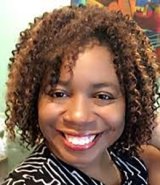Frederick Douglass Institute for Academic Excellence
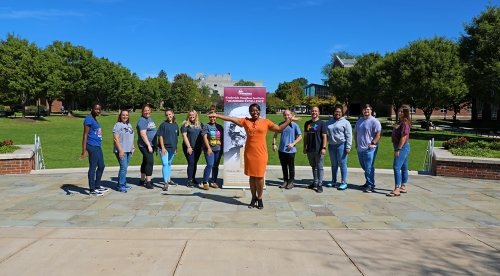
- Contact Information
- Social Media
"I know of no rights of race superior to the rights of humanity." - Frederick Douglass

Bloomsburg University's Frederick Douglass Institute for Academic Excellence, under the inspiration of Frederick Douglass and other distinguished leaders of all racial and ethnic backgrounds, promotes academic excellence among students and enhance their understanding and appreciation of human diversity.
The institute is part of the PASSHE collaborative established to enhance the academic life of participation universities and to enrich their campus climate. It enables all members of the university community to identify with a man whose life and work embody American democratic ideals and educational excellence.
The institute develops and implements collaborative and interdisciplinary teaching projects that enrich our general education and enhance the quality of our culturally diverse courses.
In addition, the Frederick Douglass Institute:
- encourages students to take responsibility for their academic performance
- encourages students to use Frederick Douglass as a model for their own academic achievement
- helps to improve the retention and graduation rate of historically under represented students
- promotes joint research projects among BU faculty and students with those in other PASSHE schools
Creative Expressions Competition
The Frederick Douglass Institute Creative Expressions Competition is open to all current BU students. It is intended to amplify the voices and perspectives of students from all disciplines making connections between social justice and culture, economics, education, history, and science. It encourages thoughtful reflection and critical thinking through creative expression in various mediums for the purpose of sharing experiences, highlighting democratic ideals and moving audiences to action.
Event Details Information in BOLT
Entries must be uploaded by March 31, 2022
Advisory for Frederick Douglass Institute
Bloomsburg University's Frederick Douglass Living and Learning Community students are assisted by upperclassman mentors as they make the transition from high school to college. Mentors help guide LLC students through their freshman experience.
To help the freshman LLC students succeed, each mentor:
- Assists with new student orientation
- Acts as a liaison between mentees and faculty advisors
- Ensures that mentees are attending class and keeping up with academic work. Works closely with mentees to help them with homework, time management and class attendance
- Ensures that mentees are adjusting to the college environment
- Alerts faculty advisors early when students are having difficulty
- Creates a support network and group identity (through social and academic activities) that includes all mentees
- Attends all Frederick Douglass LLC Workshops and official functions
- Logs their group's weekly activities and comments/questions on a confidential list for other mentors and advisors
- Meets bi-weekly with a director to discuss how mentees are adapting
Frederick Douglass Teaching Scholars
Bloomsburg University's Frederick Douglass Institute has a long history of success in advancing the academic and scholarly careers of Doctoral students from diverse cultural backgrounds.
In keeping with Frederick Douglass' life of public service and commitment to equity and access, BU's Frederick Douglass Institute is offering teaching opportunities to graduate students entering the final year of terminal degree and/or doctoral programs and recent graduates who are pursuing careers as university faculty. In previous years, Frederick Douglass scholars have moved into successful academic careers at BU and elsewhere.
The experiences gained through this program have been invaluable in their future teaching and scholarly success. The Frederick Douglass scholar’s opportunities are consistent with BU values of collaboration, community, critical thinking, diversity, excellence, integrity, knowledge, opportunity, personal and professional growth and respect.
In addition, a critical goal is to develop and retain these scholars to have maximum impact on BU's campus.
- must be U.S. citizen or permanent resident
- master’s degree and enrollment in a terminal degree program (Ph.D., MFA, Ed.D, etc.)
- academic background in one of the disciplines taught at the university
Preferred: teaching experience; currently ABD or doctorate within last two years. Applications submitted by March 15 will be given priority consideration, however applications will be continuously reviewed and considered.
Frederick Douglass Scholars Fellowships are designed to provide professional experiences, mentoring and potential employment opportunities within universities that are strongly committed to cultural diversity.
Applicants from diverse cultural backgrounds, especially those from historically underrepresented groups are encouraged to apply. As a Frederick Douglass Scholar, awardees will be provided an opportunity to teach full-time, develop a research agenda and provide service to the university during the Summer Sessions or full academic year (depending on term of appointment). Dates of employment typically run from May thru August for Summer appointments or August thru May for full-year appointments.
Scholars will be compensated as adjunct faculty, according to the university's collective bargaining agreement. Additionally, Fellows may receive assistance with housing and travel. Faculty benefits, including office space, computer and network access and library privileges are provided. The appointment is for the scholar alone, not families, and scholars are responsible for their own local transportation.
The following application documents are required:
- A Curriculum Vitae
- A letter of qualification and interest
- An unofficial copy of graduation transcripts
- A letter from your major or dissertation advisor in support of your application
- Letters from at least two additional references regarding your experience and abilities
Contact Mindy Andino, Ed.D., interim vice provost, for more information about the Frederick Douglass scholars program and particular programmatic opportunities at Bloomsburg University at mandino@bloomu.edu or 570-389-5083.
These disciplines across Bloomsburg University's four colleges are open to Frederick Douglass Teaching Scholars.
College of Education
- Early Childhood Education
- College Student Affairs
- Middle Level Education
- Reading
- Secondary Education
- Special Education (Exceptionality Programs)
College of Liberal Arts
- Anthropology
- Communication Studies
- History
- Language and Cultures
- Music, Theater and Dance
- Philosophy
- Sociology, Social Work and Criminal Justice
College of Science and Technology
- Audiology
- Environmental, Geographical, and Geological Sciences
- Nursing
- Physics and Engineering Technology
Zeigler College of Business
- Business Education
- Management
- Marketing
Kristin Austin, Educational Leadership & College Student Affairs
Kristin Austin, EdD began her higher education career as an ACT 101/EOP bridge student. With the support of resources designed for “at-risk” students, Kristin graduated from Bloomsburg University with a degree in Social Work. The mentoring, learning, and leadership experiences from which Kristin benefitted during her undergraduate experience served as a catalyst for a career in higher education. Thus, Kristin also earned a Master’s degree in Counseling with a focus in College Student Affairs from Edinboro University. After 15 years of progressively responsible experiences in undergraduate and graduate admissions, academic advising, and new student orientation, Kristin transitioned into a faculty role within the College of Education at Bloomsburg University. Here, Kristin serves as a Frederick Douglass Faculty Fellow teaching graduate and undergraduate courses in Educational Leadership and College Student Affairs.
Kristin’s professional interests and research foci include first-year experience, new student transition, enrollment management, college success for students deemed “under-prepared,” and parental involvement in college student life. To this end, Kristin’s dissertation was titled, “Parents as Partners, Not Pesters, in New Student Adjustment,” which culminated in earning an EdD in Higher Education Administration from Immaculata University. During her time as a Frederick Douglas Fellow, Kristin has presented her research at 2 national conferences, and more than 10 state and regional conferences. Further, she has been selected for awards at the state and national level through ACPA.
Brian Johnson, Communication Studies
Brian C. Johnson honors the struggles and accomplishments of the ordinary citizens who launched the Civil Rights Movement by committing himself personally and professionally to the advancement of multicultural and inclusive education.
He serves as a faculty member (Frederick Douglass Scholars Fellow) in the department of Communication Studies at Bloomsburg University. He is a founder of the Pennsylvania Association of Liaisons and Officers of Multicultural Affairs, a consortium that promotes best practices for diversity in higher education.
He earned both bachelor's and master's degrees in English from California University of Pennsylvania, and a Ph.D. in communications media and instructional technology at Indiana University of Pennsylvania in December 2016. Brian is the co-author of Reel Diversity: A Teacher’s Sourcebook (2008), winner of the 2009 Phillip Chinn Book Award by the National Association for Multicultural Education and a revised edition in 2015, ,and We’ve Scene It All Before: Using Film Clips in Diversity Awareness Training (2009). His interest at the intersections of media and society have led him to author The Problematic Tyler Perry (2016) and Glee and New Directions for Social Change (2015; with Dan Faill). In 2016, he published Reel Big Bullies: Teaching to the Problem (with James Vines).
A novelist, Johnson published his debut The Room Downstairs in 2016 and is eagerly anticipating his sophomore project Send Judah First, slated for publication in August 2019.
Beverly Natividad, intercultural communication and public speaking
Natividad, professor of intercultural communication and public speaking, specializes in critical intercultural communication, critical media studies, globalism, labor migration and transnational feminism. She received her Ph.D. in communication studies, with a concentration in culture and communication, at the University of Denver (DU).
She also received the Arts, Humanities and Social Sciences Dissertation Fellowship from DU in 2010 for her dissertation, “Exploring Transnational Feminist Alliances between Privileged and Marginalized Women through Caring Work.” Her work examined narratives of a variety of Filipino migrant women involved in care giving fields, helping her study how different women work for social justice causes.
Latonya Trotter, sociology
Trotter, a Ph.D. candidate at Princeton University’s department of sociology, has a strong interest in how organization within the health care field affects the experiences of medical workers, especially women, racial minorities and the poor. For her dissertation, she is examining how the role of the nurse practitioner is changing the medical industry.
Through her research, she is investigating how nurse practitioners’ presence could re-define what is considered medical work, medical expertise and appropriate patient care. Through her work, she demonstrates how changes in the health care field not only alter worker identities, but can also affect how people understand what it means to be sick.
Kristen Lewis - Frederick Douglass Scholar awarded discovery grant
Kristen Lewis, assistant professor of chemistry, has been awarded a grant of supercomputer time and storage from the Extreme Science and Engineering Discovery Environment (XSEDE) program. XSEDE is a single virtual system that allows scientists access to supercomputers and high-end visualization and data analysis resources across the county.
XSEDE is a five-year, $121-million project supported by the National Science Foundation. Lewis was approved for a one-year startup allocation of 50,000 SUs (service units) on Comet, a supercomputing system housed at the San Diego Supercomputer Center (SDSC), and 500GB of medium-term disk storage on Data Oasis, a data storage system also housed at SDSC.
Lewis is a computational chemist, one who studies the properties of chemicals through computer modeling. Specifically, she will be investigating the effects of hydroxyl group distribution on the stability, structure, and antioxidant activity of fullerenols – molecules related to “buckminsterfullerenes” (aka “Buckyballs”) — an important current research area in materials chemistry.
- Ashley Belle — University of Maryland: EGGS department
- Heather Ervin — Penn State : Mathematics Department
- Kristen Lewis — Jackson State University: Chemistry Department
- David Hanley-Tejeda — University of Illinois: Communications Department
- Stephanie Parham — Tulane University: History Department
- Carley Shinault — Howard University: Political Science Department
- James Vines — Clemson University: Academic Enrichment
- Michele Welliver — Penn State: Marketing Department
Frederick Douglass Achievement Program
Bloomsburg University's Frederick Douglass Achievement Program is designed to help students graduate in four years by successfully completing their second and third years of college. It is open to all sophomores and juniors in the university.
- Strive for academic excellence by attending all classes and completing all class assignments
- Inform their advisor of any difficulties interfering with their academic performance
- Participate in bimonthly advising and discussion forums with their advisor
- Adhere to recommendations made by their advisor
- Maintain a semester calendar/appointment book
- Maintain a grade log
- Participate in two FDI workshops and/or field trips per semester
- Join at least one student organization off campus
- Participate in at least one community service project that SOLVE sponsors
- Explore the possibility of engaging in an independent study/research project with their academic advisor
- Attend at least one student conference per academic year
- Strive to maintain overall GPA of 3.0
Frederick Douglass Debate Society
The award-winning Frederick Douglass Debate Society at BU provides to its members training in argumentation and advocacy with a focus on contemporary issues of social justice.
Underlying this purpose is the belief that access to high-quality debate resources, mentorship, and networking opportunities is itself a social justice issue. Members work with coaches and with each other in weekly meetings to conduct research, prepare cases, develop argumentation strategies, and hone cross-examination skills. Membership in the society provides a unique opportunity for you to work and build life-long partnerships with highly-motived students and dedicated coaches.
Through participation in public exhibitions and competitive debate tournaments, the society empowers members with valuable analytic, research, public speaking, and leadership skills that form a basis for academic and professional success. Alumni of the program have gone on to attend law school and graduate school. They have also forged meaningful careers in politics as well as in public, corporate and non-profit sectors.
Members compete in switch-side policy team debate against other PASSHE schools in a tournament sponsored by the Frederick Douglass Institute Collaborative. In switch-side policy debate, competitors are expected to be able to debate both sides of a topic in order to determine what course of action should be taken to address a significant and harmful problem. This poses a unique challenge, pushing members to test and ultimately strengthen their beliefs about the best available strategies of bringing about social and political change.
In the past, students have debated whether protests in the wake of police brutality should be considered rioting, if hate speech should be prohibited on PASSHE campuses, if confederate monuments should be removed from public property, if all United States citizens have a right to health care, and if the United States Federal government should provide reparations for slavery.
Bloomsburg has an established record of competitive success. In 2018, the team of Tanisha Webster and Amanda Weaver were tournament champions https://bloomsburgu.tumblr.com/post/174574339662/bu-team-wins-frederick-douglass-debate-society
In 2015, the team of Jordan Kennedy and Stefon Brown placed 2nd.
https://bloomsburgu.tumblr.com/post/119532552792/nearly-20-students-repr...
The society also sponsors and participates in public debate exhibitions. In a “Your Voice Your Vote” organized by the Institute for the 2020 Presidential Election, society members Nancy Bucci and Ryan Williams debated members of the BU Forensics team on whether or not Donald Trump should be re-elected. In November 2019, the society hosted the British National Debate Team. The society also encourages members to present their research to academic conferences. Society members have presented their work at the annual conventions of the National Communication Society and the Eastern Communication Association.
Selected Program Highlights
- 2020: The society partners with the Commission on Presidential Debates to host Debate Watches for the Vice Presidential Debate and the 2nd Presidential Debate.
- 2020: “Your Voice Your Vote” public debate against the BU forensics team on the 2020 Presidential Election. Due to the COVID-19 pandemic, this event was held on Zoom.
- 2019: The society hosts the British National Debate Team.
- 2018: Tanisha Webster and Amanda Weaver are champions of the 4th Annual tournament hosted by West Chester University.
- 2015: Jordan Kennedy and Stefon Brown place 2nd at the 2nd Annual tournament hosted by Bloomsburg University.
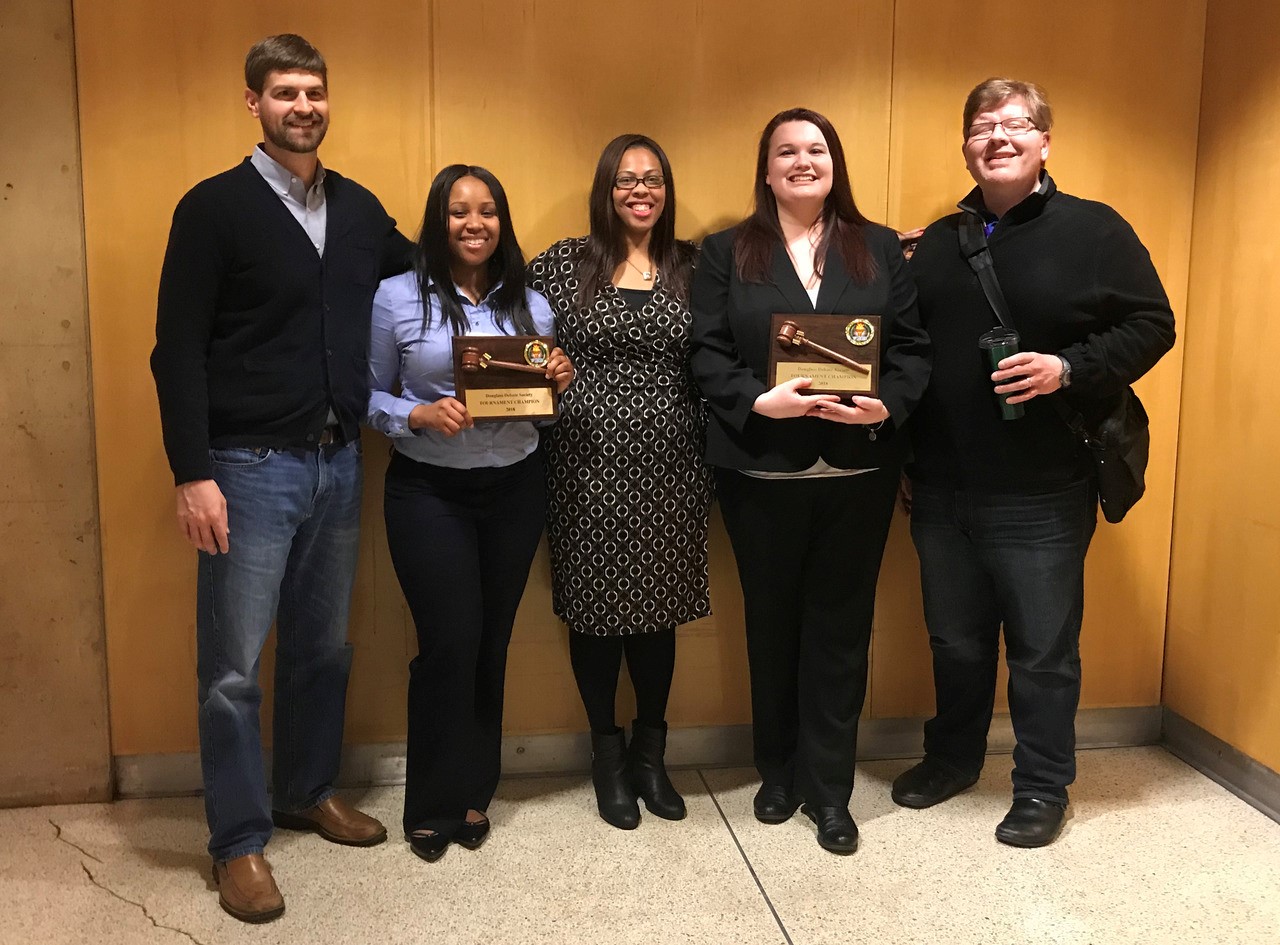
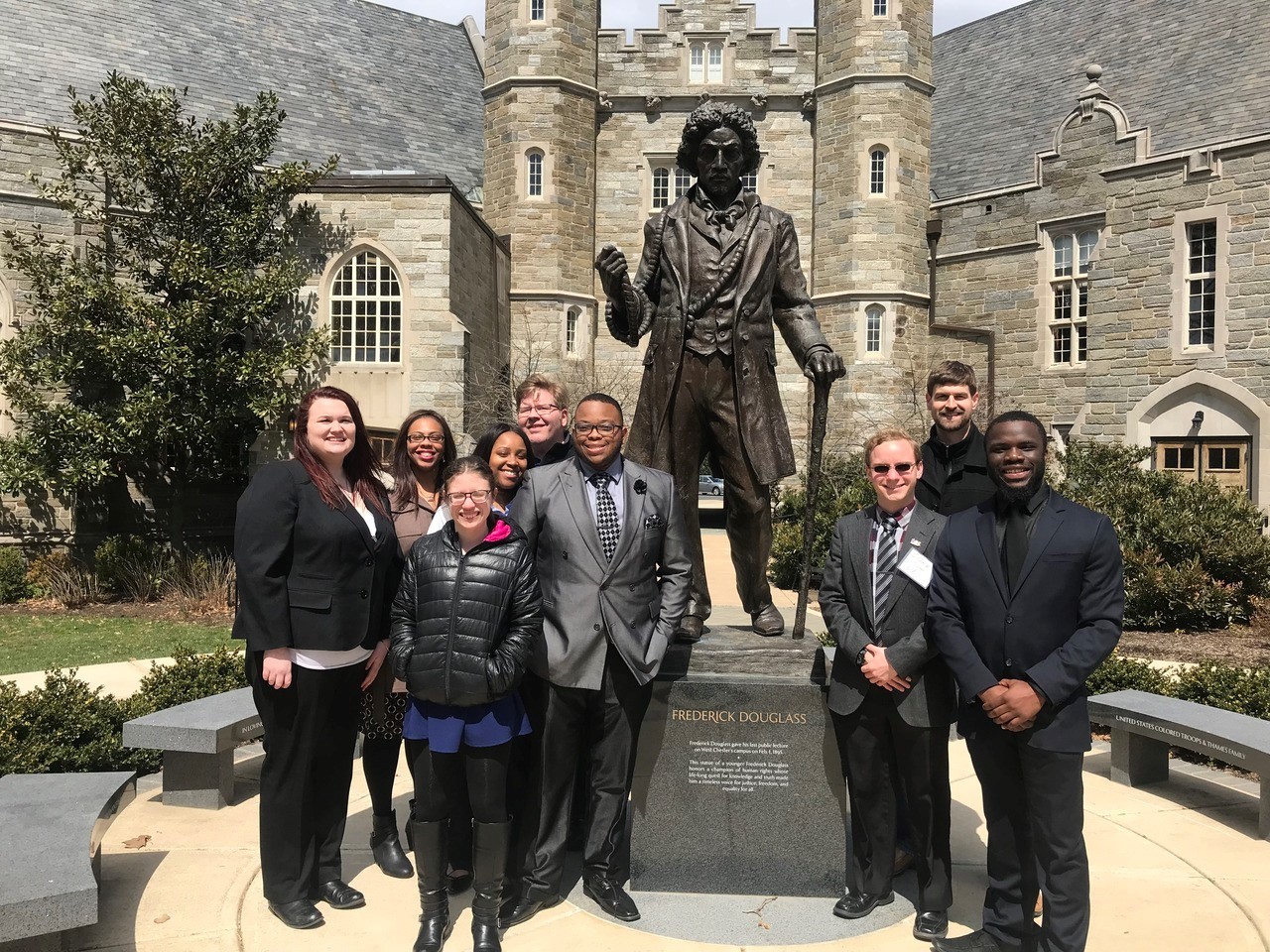
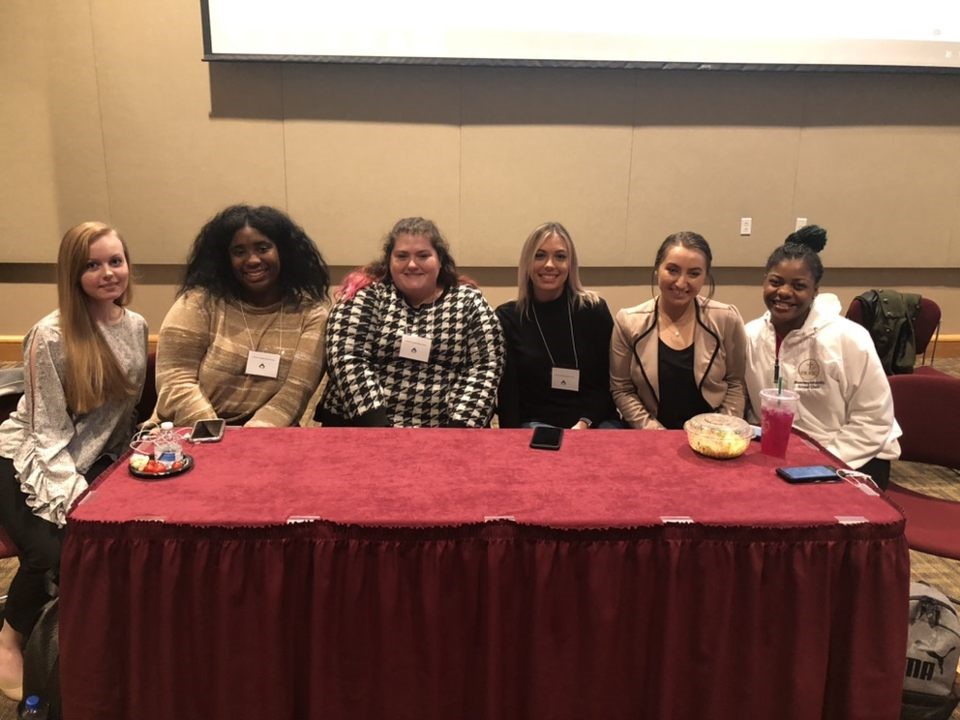
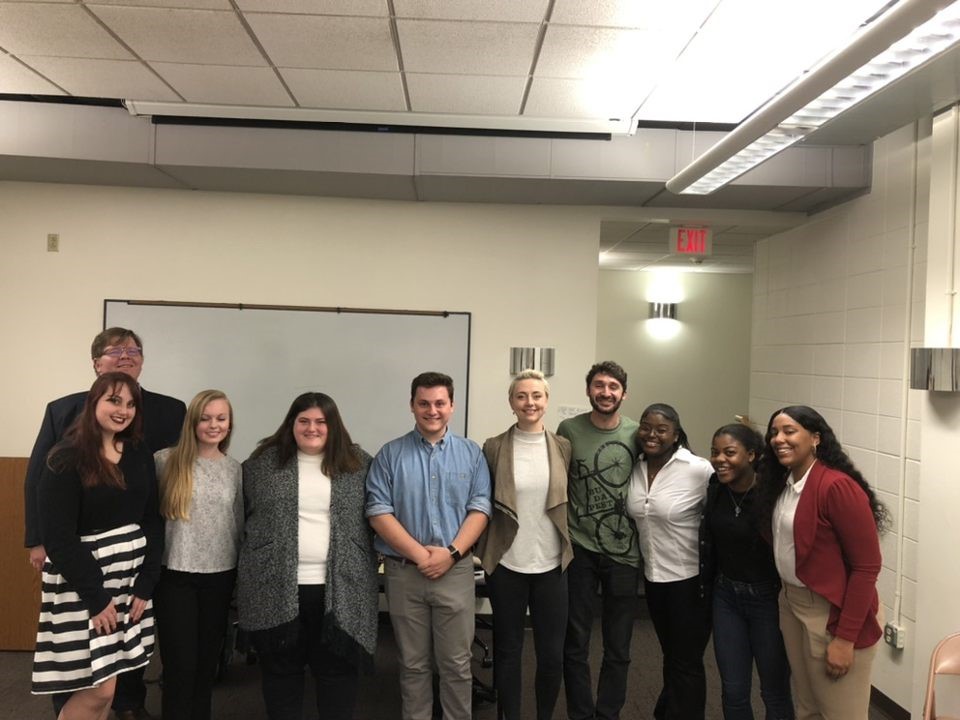
Frederick Douglass Social Justice Learning Community
The focus of the Frederick Douglass Social Justice Learning Community is to celebrate the legacy of famed abolitionist Frederick Douglass.
- Helps students ease their transition to college and meeting people with similar interests and passions for social justice
- Students may participate in themed programs exploring diversity and social justice issues
- Students receive support from seasoned peer mentors
- Develops students’ skills to become socially conscious, self-advocating, and free thinkers
The Frederick Douglass LC welcomes all first-year students of any major or those presently undeclared. This LC participates in conjunction with the Frederick Douglass Institute to promote academic excellence in a culturally diverse setting. The LC focuses on developing students to be critical thinkers and provides a platform for students who are passionate about social justice issues.
The Frederick Douglass LC focuses on multiculturalism as it pertains to a myriad of identities that encompasses ability, age, gender identity, sex, sexual identity, nationality, race, religion, socioeconomic status, class, and more. This LC is a great way to educate one’s self and others on topics related to diversity, equity, and inclusion.
Students who sign up for the Frederick Douglass LC will be involved in undergraduate interdisciplinary conferences, academic field trips, monthly social and educational events centered on social justice topics, and more. Past programs have focused on topics including the importance of recent civil rights protests, honoring the legacy of Indigenous people in the local region, exploring one’s cultural competence in understanding identities of difference, and examining environmental justice issues that create disparities between individuals based on socioeconomic status and social class. The purpose of these programs is to educate and provide a space for student voices on important issues that impact people in real ways.
Students can also get involved in the LC by serving as Learning Community Mentors. These are paid, part-time, student-staff members who are hired to support first-year LC members in their transition to college. Mentors collaborate with the LC Director to plan the monthly social and educational events and hold one-on-one meetings with the LC members to help them acclimate to life at Bloomsburg University.
Participating in the Frederick Douglass Learning Community in any capacity offers students opportunities to develop the skills that they need to create positive change within themselves, on Bloomsburg University’s campus, and in the larger global community.

